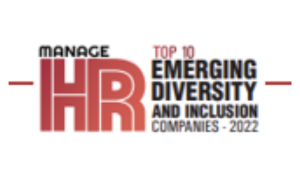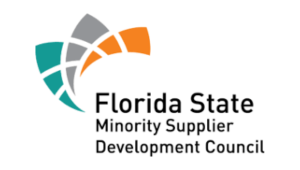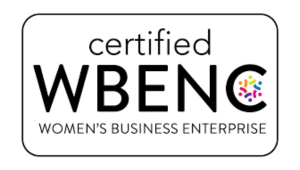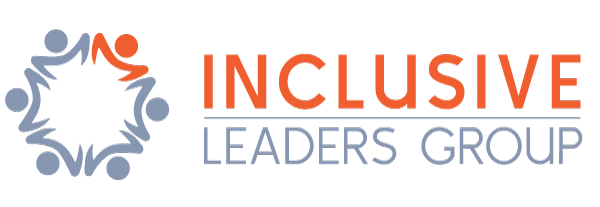Prior to the global awakening of social justice and racial equity elevated by the killing of George Floyd in 2020, CEOs diversity, equity, and inclusion (DEI) statements of commitment used to be considered desirable publications for only the most progressive companies and organizations. But now, employers are focusing more on racial, gender, and sexual orientation diversity and are taking a more determined approach to workplace DEI.
Diverse teams are more innovative, likely to be more reflective of the customer base they’re trying to attract, and can even impact a company’s bottom line. A McKinsey study revealed that companies with the most ethnically diverse executive teams were 33% more likely to outperform their peers.
For example, Accenture’s DEI commitment statement is about creating a culture of equality in their workplace with a clear statement of action. Accenture uses bold color blocks and fonts to share its message of acting against racism, by leading and driving change.
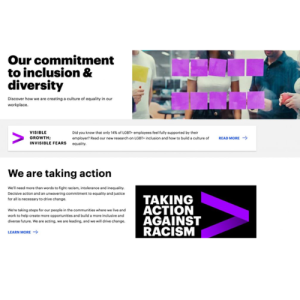
Employees and Job Candidates Expect To See Your Actionable CEO DEI Commitment Statement
As a result, job seekers expect their potential employer to have a substantive and actionable CEO DEI commitment statement:
- Nearly three in four Americans say they are more likely to seek employment with companies that are committed to breaking down discriminatory hiring practices, according to an annual survey conducted by staffing and workforce solutions provider Kelly. “Companies are in desperate need of skilled talent. At the same time, millions of qualified job seekers face significant barriers to employment,” says Kelly Vice President and Equity@Work Program Manager Pam Sands. “It’s time employers provide fairer access to work for these talent groups. Our survey results indicate it will have a positive impact on their ability to identify skilled workers across the board.”
- Failure to meet these heightened expectations can make retention and recruitment more difficult for employers. In a recent Robert Half survey, 71% of workers said they’d leave an organization whose values do not align with their own.
- Millennial and Gen Z professionals are avoiding companies without a diverse workforce, clear promotion track and a commitment to confronting systemic racism in their workplace.
How to Write a company’s CEO Diversity, Equity, and Inclusion Statement
Your diversity, equity, and inclusion (DEI) statement can send a powerful message about CEO and leadership priorities, often generating positive emotional reactions from employees and job candidates, but also from clients, customers, and consumers. Yet, despite the benefits, many companies don’t advertise their commitment to diversity, equity, and inclusion. Only 13 percent of respondents to joint research from ICIMS and Talent Board include a DEI commitment statement on their careers site.
The Walt Disney Company’s commitment to DEI is all about creating stories and sharing the experiences of generations of people. Disney highlights “impact stories” about its pledge to advance social justice, finding resolve in times of unrest, and earning top marks for LGBTQ equality.
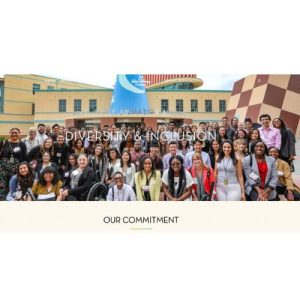
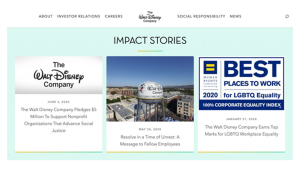
My team and I at Inclusive Leaders Group recommend these key considerations when consulting with clients:
- Be authentic. The number one aspect of a strong D&I statement is authenticity. Your statement should sound like it came from real people who genuinely care about creating an inclusive work environment.
- Speak to your company’s story. Another way to add authenticity is to tell your company’s story. What are your values? What’s your mission? How do those play into DEI?
- Don’t write a compliance statement. Whatever you do, don’t use overly legal language. Unfortunately, this is the approach many companies take.
- Create an “enrollment process” as part of the vision. Ask for your employees’ buy-in and include them in crafting your DEI statement.
- Include elements of the DEI statement in Talent Management. Align and integrate with hiring, onboarding, and employee performance reviews.
- Use positive, equitable, and inclusive language. While you should acknowledge inequality and inequity, your DEI statement should include lots of positive words that evoke warm feelings. For example, use words such as: inclusive, grow, freedom, better, improve, welcome, belonging, authentic, etc.
- Be specific: Don’t be evasive. State exactly what your company plans to do to promote DEI in its workplace and society. For example, Netflix’s inclusion page says: “Our Employee Resource Groups (ERGs) are vital to creating this sense of inclusion and belonging. ERGs are communities of employees who create space to connect on their shared experiences. We have 15 ERGs serving Latinx, veteran, Black, and disability communities to name a few (full list below).” Google also lists its Employee Resource Groups, including Africans@Google, Greyglers, Trans at Google, Disability Alliance, and more. Nike outlines its specific diversity targets and current representation figures.
- Implement some KPIs. Include some metrics to measure the statement and strategy’s success.
- Be creative. Your DEI statement should be unique to your organization, and it should be fun, inspiring, and unique like Accenture’s and The Walt Disney Company’s above.
- Revisit the statement and strategy at least once a year, if not more often, to reiterate your commitment and make sure all employees are aligned.
While creativity and graphics can be important, nothing beats the words of a CEO DEI commitment themselves, For corporate clients I often use Paul Knopp, Chair and CEO of KPMG as a messaging role model when consulting on their statement. With hospitals and health systems Gianrico Farrugia, M.D., President & CEO, Mayo Clinic is a healthcare example I refer to.
An effective CEO DEI commitment statement is the first step towards developing your DEI strategy and creating an inclusive culture that celebrates all dimensions of diversity and where everyone feels a sense of belonging. Make your commitment to diversity, equity, and inclusion public through a DEI statement to hold yourself and your company accountable for change.
We can help you create your DEI commitment statement and develop your DEI strategic plan.
Let’s have a virtual coffee and/or connect on LinkedIn!
 As CEO and Principal Consultant of Inclusive Leaders Group, LLC, Charlotte Hughes MS, CDP, SHRBP, CPLP brings a diverse background as an accomplished Workforce and Organizational Development and Diversity & Inclusion global thought leader and practitioner for major Fortune 100 companies and one of the largest health systems in the U.S. Charlotte helps organizations develop their DEI strategy and provides DEI education for talent and organizational development. Schedule a discovery discussion with Charlotte about creating your DEI commitment statement and developing your DEI strategic plan. Contact her on Calendly or this Contact Form.
As CEO and Principal Consultant of Inclusive Leaders Group, LLC, Charlotte Hughes MS, CDP, SHRBP, CPLP brings a diverse background as an accomplished Workforce and Organizational Development and Diversity & Inclusion global thought leader and practitioner for major Fortune 100 companies and one of the largest health systems in the U.S. Charlotte helps organizations develop their DEI strategy and provides DEI education for talent and organizational development. Schedule a discovery discussion with Charlotte about creating your DEI commitment statement and developing your DEI strategic plan. Contact her on Calendly or this Contact Form.





